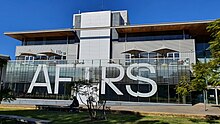


AFTRS building
| |
| Type | Screen and broadcast school |
|---|---|
| Established | 1973; 51 years ago (1973) |
Academic staff | Film, television and radio |
| Undergraduates | Bachelor of Arts Screen: Production |
| Postgraduates | Master of Arts Screen, Master of Arts Screen: Business and Leadership, Graduate Diploma in Radio and Podcasting |
| Location |
,
,
33°53′41″S 151°13′43″E / 33.8946°S 151.2285°E / -33.8946; 151.2285 |
| Campus | The Entertainment Quarter, Moore Park |
| Website | aftrs |
The Australian Film Television and Radio School (AFTRS), formerly Australian Film and Television School, is Australia's national screen arts and broadcast school. The school is a Commonwealth Government statutory authority.
Established in 1972 as the Australian Film and Television School, as part of the Commonwealth Government's strategy to promote the development of Australia's cultural activity, AFTRS was opened to students in 1973, with the first intake of 12 students including directors Gillian Armstrong, Phillip Noyce and Chris Noonan.[citation needed]
In 1973 Jerzy Toeplitz was appointed Foundation Director of the School and after six years in the role was awarded the Order of Australia and the AFI's Longford Lyell Award.[citation needed]
In 1975 Gough Whitlam helped to create funding agencies to support the film school.[citation needed]
For many years AFTRS was located in purpose-built premises at North Ryde, Sydney. In 2008 the school relocated to a purpose-built facility adjacent to Fox Studios, located inside the Entertainment Quarter in Moore Park, Sydney.

The campus includes: a full-size 5.1 sound theatre (seats 126), state-of-the-art mix theatre, two large professional film and television studios, film studios, state-of-the-art sound recording studios, and a host of other facilities and equipment.[1]
Admission into AFTRS degree courses is competitive and based on merit selection. Places are limited. As of 2024[update] offerings include:[2]
As a statutory body,[3] AFTRS is governed by the Australian Film Television and Radio School Act 1973 with its Council responsible to the Minister for the Arts, representing the Federal Parliament. There are nine members of the Council:[4]
As of April 2024[update], Rachel Perkins is chair of the council,[4] while the CEO is the screenwriter Neil Greenwood.[5]
The school is a member of ARTS8: the Australian Roundtable for Arts Training Excellence, a group of arts training organisations funded by the federal government.[6]
Amanda Duthie, Adelaide Film Festival artistic Director and virtual reality champion, along with Google Creative Technologist Mathew Tizard and AFTRS Head of Documentary Rachel Landers, sat on the jury for the inaugural AFTRS International VR Award in 2017. Nothing Happens, by Michelle and Uri Kranot, won the award, while The Other Dakar by Selly Raby, based on Senegalese mythology, received a Special Mention.[7] The Unknown Patient, by Australian director Michael Beets won the award in 2018.[8]
As of 2024, four AFTRS student films had been NOMINATED for Academy Awards:[9]
Six AFTRS Alumni are winners of the Academy Awards®:
Five AFTRS alumni were NOMINATED for the Academy Awards®:
This article's list of alumni may not follow Wikipedia's verifiability policy. Please improve this article by removing names that do not have independent reliable sources showing they merit inclusion in this article AND are alumni, or by incorporating the relevant publications into the body of the article through appropriate citations. (August 2020)
|
The entire list of AFTRS graduates by year, from 1973 to now, can be viewed on the School's website.[10]
Directing
Producing
Screenwriting
Cinematography
Editing
Composing
Design
Radio
|
ARTS8 Australia's national elite arts training organisations
| |
|---|---|
| Training organisations | Australian Ballet School (Southbank, Victoria) • Australian National Academy of Music (South Melbourne, Victoria) • Australian Youth Orchestra (Sydney, New South Wales (NSW)) • Flying Fruit Fly Circus (Albury, NSW) • NAISDA Dance College (Mount Penang, Gosford, NSW) • National Institute of Circus Arts (Prahran, Victoria) • National Institute of Dramatic Art (Kensington, NSW) |
| Associated training organisations | |
| International |
|
|---|---|
| National |
|